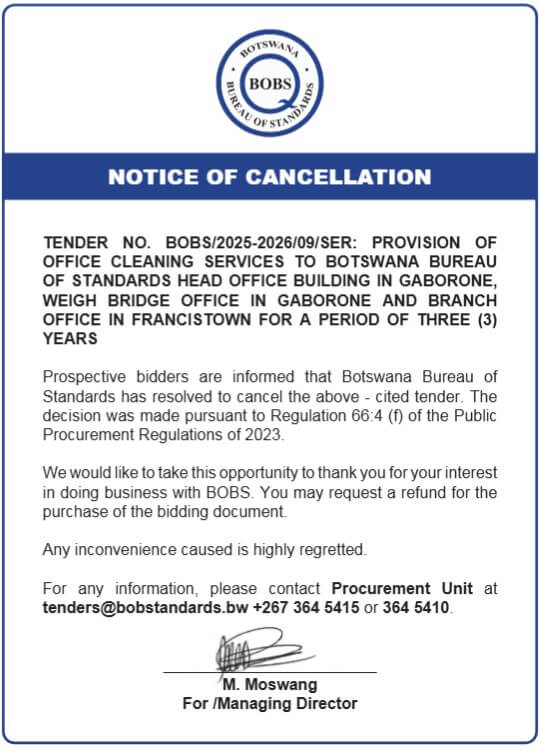Curiosity may have killed the cat but for Tebogo Mogaleemang, an inquisitive nature proved the key to his success.
An Engineer by profession, Mogaleemang soon realised the creative shackles of the corporate world were not for him
With a passion for problem-solving, modern technology and Applied Maths, Mogaleemang combined all three to found Spectrum Analytics in 2017.
Based in Gaborone at Stanbic Bank incubator, the ever-evolving tech-company and its team of professionals create value from data, helping companies and communities fulfill their full potential.
This is the story of Spectrum Analytics, as told by its founder and Chief Executive Officer (CEO), Mogaleemang…
Who is Tebogo Mogaleemang?
I was born and raised in Gaborone. I graduated with a Master of Engineering in Electronics specialising in Telecommunications from the University of Southampton in the UK in 2008.
What were you up to job-wise before starting Spectrum Analytics?
I started my professional journey in Research and Academia as a Teaching and Research Assistant in the Faculty of Engineering and Technology at the University of Botswana (UB) in 2008 after returning to Botswana. I then joined Mascom as a Core Network Engineer in June 2009. There were limited opportunities for creative problem solving within the role, so I jumped at the opportunity to be a WiMax Engineer.
It was a new role within the company hence it promised new challenges and opportunities for creative expression. The role lived up to my expectation as I re-designed and implemented a fully functional WiMax radio network based on Huawei technologies. I was trained to solve complex problems as an Engineer, so the corporate environment was creatively stifling back then.
So when was the entrepreneurship spirit cultivated?
I left Mascom in 2012 to re-think what I really wanted to do to avoid the predictable and repetitive part of the corporate world. I got a BIUST scholarship to do a PhD in Applied Mathematics after leaving Mascom but turned down the scholarship as I enjoyed doing consultancy work more. That is when I realised I could be paid for my skills, so the entrepreneurship seeds were perhaps sown then.
I was fascinated by inefficiencies and possibilities to optimize decision-making through Applied Mathematics, which naturally led to Data Science and Machine Learning in 2013.
And when did you realise your love for technology?
I have always been curious about things I do not know – and still am. Interestingly, I wanted to study Chemical Engineering after doing BSc General (part I) at UB, but the career advisors interviewing us for government scholarship for overseas placement pushed me towards Telecommunications and I followed their advice. I got a Government scholarship in 2003 to do Telecommunication Engineering in UK.
My studies in UK exposed me to cutting edge technologies: from the theory, research, and industry applications. I think the switch flipped when I saw the possibilities digital technologies had in solving our local challenges, especially at grassroots level. I think using STEM (Science Technology Engineering and Mathematics) for social good fuels me, so my current love for technology is driven by that.
Now tell us about Spectrum Analytics?
We provide professional services, hardware, and AI solutions to address modern infrastructure, data, and workload management challenges. We focus on cases of IT infrastructure optimization, infrastructure modernization – including cloud migrations, and the automated management of data across hybrid cloud environments.
Enterprises generate insane volumes of data that holds opportunities to improve efficiencies, improve customer and workforce experiences, and identify new opportunities through informed decision making. Our solutions are designed to meet enterprises wherever they are on the journey to become data driven. We really exist to enable enterprises to create value from data, which we believe is required if Africa is to thrive in the digital economy.
What inspired this?
I did an Engineering degree that was heavy in applying Mathematics and Computing in the allocation and utilisation of radio network resources. I picked on Data Science very early in 2014 as it applies the same things I learnt as a student. My degree had provided me with the tools I needed to learn this on my own as I was just re-purposing my skills. I started with freelance consulting and eventually registered a business on the back of this.
The business modeling came much later along the journey, and it has changed so many times over the years and will continue to change to adapt to evolving market requirements. That is what innovation is really all about for me
Your company’s tagline is ‘Driving business value through data management solutions for modern businesses in Africa and the world’. Please elaborate on this?
Globally, enterprises that leverage data to drive business value creation are the ones thriving best in the digital economy. Data is recognized as the primary driver of value in the new economy, with some even referring to it as ‘the new oil’. It is an asset that does not appear in the data sheet of financial statements but still needs to be intentionally managed if it is to be of benefit to any organisation.
It is a double-edged sword since possessing it comes with risks and responsibilities that can cripple any business: from cyber security risks, data breaches, and non-compliance with data protections regulations.
In terms of deriving value from data locally, how advanced are we as a country?
Our industries are still taking baby steps to address what I believe are fundamental challenges that their counterparts in mature economies have long solved. This also gives us an opportunity to leapfrog by avoiding mistakes that everyone made in their learning process to get where they are. Companies within our industries are at different levels of maturity but we have found that companies in banking, mining, and telecommunication spaces are increasing experimenting to close the gap with their global peers.
How have your services been received locally?
We have received a positive reception in the market across industries such as the telecommunications, financial services (banking, insurance) and mining sector. Innovation companies are exploring opportunities to leverage data to drive business outcomes and gain a competitive edge, but most enterprises are struggling to figure out how to achieve that. Our commitment to meeting enterprises where they are in their digital transformation journey not only positions us as the partner of choice but also re-assures customers that we understand their unique challenges and needs.
This customer-centric approach allows us to customize solutions, build trust, and align with their objectives, ultimately empowering organisations to harness the potential of their data, expedite business achievements, and secure a competitive advantage.
Any plans to roll your services beyond BW?
We have registered under the same name in South Africa. We are learning by doing and positioning our services in a new market with its own dynamics. Our long-term vision is to service the same industries across Africa. In the medium term, we are targeting Southern Africa. We believe our Skills Development and Graduate Development program can help Africa build the technical and creative capacity required to thrive in the digital economy.
What memorable milestones has Spectrum Analytics achieved so far?
Having a team that has a shared vision of the culture we need to achieve our organisation and personal goals is one of my major milestones and achievements. We have also worked with all types of organisations over the years; from government, industry: mining, banking & insurance, and telecommunications. That has allowed us to gain valuable insights and our own support ecosystem around us.
Receiving Botswana Innovation Fund funding through Botswana Digital Innovation Hub was also a major milestone for us. It allowed us to demonstrate the value of automation and data by solving a problem close to my heart. In 2021, we got selected to join the NetApp Excellerator programme for global deep tech startups. Out of about 390+ global startups we were part of the eight selected for the Cohort 9 group – we are the only African company to participate in the program. That allowed us to learn more about NetApp products and services hence we have since pivoted on infrastructure and data management. We are now a NetApp Gold partner, and this for me is one of our biggest achievements to date as it significantly differentiates us in the market.
On a less memorable note, what challenges stand out?
There have been many over the years. At each level of our maturity, we came across unique challenges. From the shortage of skills, lack of market validation, limited market access, limited and funding. Our siloed and fragmented approaches in our innovation space is still a challenge to this day. We have also faced unique challenges on enterprise innovation as companies in some industries we target still make procurement decisions from their headquarters outside Botswana. However, for me, the biggest challenge was in building a team that embodies the values we have rooted our organisational culture on.
Any Corporate Social Responsibility initiatives you are currently engaged in?
At Spectrum Analytics, we firmly believe in the importance of balancing profit and impact. Our commitment to creating a positive impact has shaped our business strategy from inception. We are actively looking for opportunities to utilize data and emerging technologies to tackle pressing social challenges in our communities. In 2020, we received Government funding through Botswana Innovation Fund to digitize the delivery of social assistance services. Our goal is to match vulnerable demographics to social assistance programmes in our ecosystem to improve social coverage levels. This not only improves the lives of those in need but also enhances transparency and accountability in social service delivery through data driven decision making. With about 730 million people in Africa in need of similar services, we are looking to go beyond our borders into Africa and the rest of the developing world, India and South America included.
On another CSR case, we have been actively working in collaboration with the National Blood Transfusion Services to explore how we can leverage data driven interventions to address the perennial blood shortages in Botswana. As we know, people’s loved ones are losing lives because of this. We are exploring opportunities to leverage data to find a sustainable solution to the problem.
Lastly, what are your future plans for Spectrum Analytics?
We are an ambitious company that looks to expand beyond Botswana’s borders into Africa. We are on a mission to address Africa’s digital transformation through data innovative solutions. For us the challenge for our context is simple: Africa has to adapt or perish.















